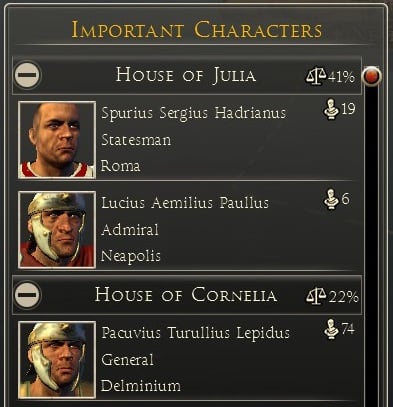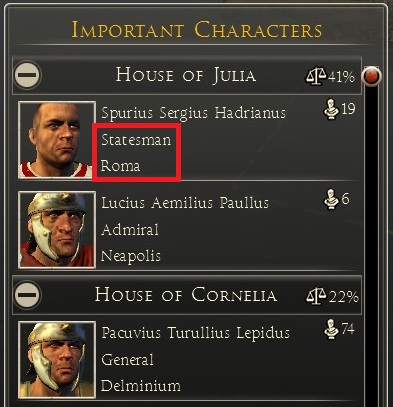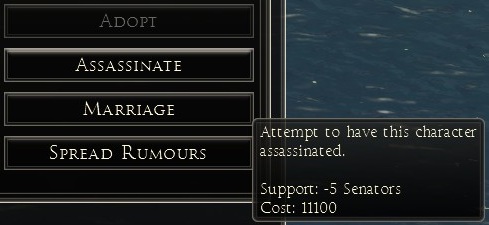Domestic policy | Politics
Domestic policy in Total War: Rome II is the constant competition between major houses (Rome, Carthage) or tribal elders and chiefs (barbarians) or royal family and princes in Hellenic and Middle East factions.
Interface
Once you open faction window (5 key) you'll see information about your faction. There is its name at the top along with its actual leader and his influence in the Senate or tribal council (both in percentage and a specific number of senators).

Below you'll find window important characters. There are all actual and retired (currently residing in the capital) leaders and additional characters appearing during random events.

On the right side of the window you can get to know details about your faction (culture, regions and provinces owned, capital, treasury and prosperity). Below that you'll find current traits - bonuses affecting your faction. There are traits of your family as well as temporary bonuses, caused by recent random events or being rewards for completing Senate missions.

Empire window shows the influence of your country on the world situation. Along with subsequent conquests of regions or entire provinces and completing mission ordered by the Senate, empire progress bar is raising. When it reaches another border value the number of available armies, fleets and agents will increase. Number of possible edicts will also increase.

The last one is diplomacy window, showing your relations with neighboring countries: active military allies, defensive allies, trade partners and declared wars.

In the upper part of the screen you'll find two additional tabs: records and stats. In the first one you'll find your last activities and in the other one - your achievements during the actual campaign.
Once you select one of the characters, a new window will open. You'll find there a rank of the leader, his age (characters die of old age), ambition (strive for fame and glory) and gravitas (how the character is seen in the ancient world; after multiplying it with the ambition you'll get the effective number of gravitas for given character).

This window shows also traits and household of the given character and his skills. Below this there are few options allowing for interaction with the given general.

Mechanics
During domestic games your main task is to keep a balance between individual parties. The support of the Senate can be obtained in several different ways, but each method is based on the effective gravitas of your characters - this is gravitas multiplied by ambition of given character (so the character with 30 gravitas and 3 ambition is much more effective than the one with 70 gravitas but 1 ambition). The more points you gain within your party, the better.

Support can be obtained in several different ways. The fastest but quite rare method is completing missions order by the Senate. After completing the mission, few senators will join you. But you'll more often use another option: gaining support thanks to constant conquests. In this case the more effective gravitas the general has the better results he gets. But there is also a third path, available to every well-educated character who has been promoted within Rome political structures. If you replace the commanding army general with another character, he will withdraw to the capital, where he will take part in deliberations of the Senate. In this case his effective gravitas will influence the strength of your group every turn.

Unfortunately other parties do not sleep. At a time when you try to get support of the Senate, other parties slowly grow up in strength. Generals under your control belonging to the rival family also generate gravitas and thus interfere with your actions. This problem can be solved in different ways: you can send the given general with his army on a suicide mission and if you not at any war right now, you can just hire an assassin (faction window). Another option is to spread rumors which will reduce the influence of the character, but in my opinion the assassination is more effective option. In addition some characters can be adopted - they will then join your family. In case when other party gets their influence over you, you can even the odds by arranging a marriage between representatives of feuding families.

From time to time you'll get information about achievements of one of your family members. This could be a crazy general looking for applause, incompetent surgeon leaving dozens of bodies behind or unfaithful wife of one of your generals. In such case you'll be able to make a small choice, which then will result in increase or decrease of your support.
In conclusion, you get the Senate's support by:
- Completing missions
- Conquest
- Characters' activities in the Senate
- Adoption
- Marriage
- Random events
The parties opposite to you can be blocked by:
- Sending general on suicide mission
- Assassination
- Adoption
- Marriage
- Random events
Do political games have influence on the gameplay? Yes. Keeping the balance between factions is the best solution. When you stop paying attention to it, it can lead to situation when one party has a significant advantage over another. In this case assassins will appear and sooner or later you'll be losing your most experienced generals. What's worse, if you do not pay attention to your own party strength, there can even come up to the civil war.
Civil war
Discords between parties can lead to civil war. It can happen in two ways. In case of Rome and Carthage, when your party gets too powerful, other families can stand up armed against you - you'll have to defeat their armies approaching the capital in order to restore peace in the country. The victory in such battle will allow you to choose the political system: you'll be able to stay with republic or start empire era - each of them has different bonuses.
There is also second option: when your party is considered as too weak due to small influence in the Senate or tribal council, you'll be exiled. This time you'll have to use loyal armies and retake lost provinces.
Regardless of the civil war cause, after several turns negotiations will start. Their result depends directly on the military power of each party, so it would be good to make sure that in extreme situations the generals commanding the most powerful armies are in your family.
You are not permitted to copy any image, text or info from this page. This site is not associated with and/or endorsed by the SEGA or Creative Assembly. All logos and images are copyrighted by their respective owners.
Copyright © 2000 - 2025 Webedia Polska SA for gamepressure.com, unofficial game guides, walkthroughs, secrets, game tips, maps & strategies for top games.
